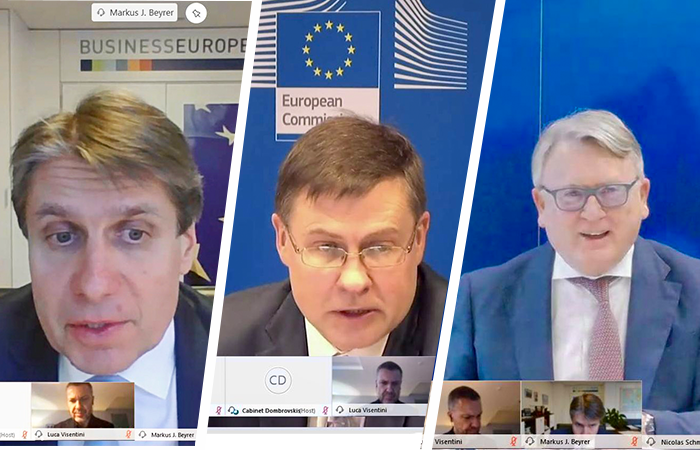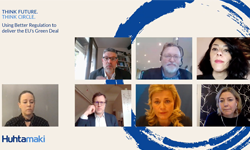BusinessEurope Headlines No. 2021-03
Action plan on European pillar of social rights: Focus needed on growth, jobs and skills

"The upcoming European Commission's action plan to implement the European pillar of social rights should support a successful economic and social recovery across Europe. Extraordinary resources have been gathered to support the recovery in Europe. It is now essential to make the right choices to make the best of these resources", said Markus J. Beyrer, BusinessEurope Director General, in a meeting held on 2 February between Executive Vice-President Valdis Dombrovskis, Commissioner Nicolas Schmit and the EU cross-industry social partners dedicated to the upcoming Commission’s action plan on the European pillar of social rights. "In the social dimension, a key challenge is to address at the same time the short-term social challenges of the Covid-19 crisis, and the need to make tangible progress on the implementation of structural labour market reforms at the national level. Growth, jobs and skills should be at the heart of the Commission’s action plan. If well designed, recovery investments can help improve the performance of labour markets and social systems. Making progress also requires reinforcing the quadri-partite cooperation between the Commission, the Council, employers and workers. These four players are the ones who can take responsibility for the necessary measures".
Contact: Maxime Cerutti
Innovation front and centre when designing regulation
 "We need innovation at the centre of designing regulation because in some cases Europe is lagging behind its competitors", said Alexandre Affre, BusinessEurope Deputy Director General, on 28 January at the ‘Think Circle’ event, organised by the company Huhtamaki to discuss using better regulation to deliver the EU’s Green Deal with MEP Virkkunen and Patrick ten Brink from the European Environmental Bureau. "When it comes to pushing for a more circular economy, it should be driven by the goal of making Europe more innovative", stressed Affre, adding that "giving industries the choice to select the best technologies to achieve objectives is the right framework".
"We need innovation at the centre of designing regulation because in some cases Europe is lagging behind its competitors", said Alexandre Affre, BusinessEurope Deputy Director General, on 28 January at the ‘Think Circle’ event, organised by the company Huhtamaki to discuss using better regulation to deliver the EU’s Green Deal with MEP Virkkunen and Patrick ten Brink from the European Environmental Bureau. "When it comes to pushing for a more circular economy, it should be driven by the goal of making Europe more innovative", stressed Affre, adding that "giving industries the choice to select the best technologies to achieve objectives is the right framework".
Contact: Alexandre Affre
EU Council’s position is key in fixing a flaw in EU standardisation
 More than three years of discussions with the European Commission without a substantive result in resolving systemic bottlenecks of the EU harmonised standardisation: now the business community turns to the European Council and Member States in a united call to urgently address the over-prescriptive Commission’s approach to standardisation that costs industry competitiveness, innovation and its commercialisation as well as global leadership in standards. If we are to deliver on Europe’s smart technological sovereignty aspirations and the twin green and digital transition objectives, Europe needs its standardisation system to be flexible and responsive to the demands of modern society. BusinessEurope and its partner organisations call on the Council to send a strong political signal towards the Commission in this regard.
More than three years of discussions with the European Commission without a substantive result in resolving systemic bottlenecks of the EU harmonised standardisation: now the business community turns to the European Council and Member States in a united call to urgently address the over-prescriptive Commission’s approach to standardisation that costs industry competitiveness, innovation and its commercialisation as well as global leadership in standards. If we are to deliver on Europe’s smart technological sovereignty aspirations and the twin green and digital transition objectives, Europe needs its standardisation system to be flexible and responsive to the demands of modern society. BusinessEurope and its partner organisations call on the Council to send a strong political signal towards the Commission in this regard.
![]() Contact: Martynas Barysas
Contact: Martynas Barysas
Revising the Energy and Environmental State Aid Guidelines
 European businesses should be supported in their transformation towards climate neutrality, sustainable growth, job creation and prosperity, and the Energy and Environmental State Aid Guidelines have an important role to play in achieving this - BusinessEurope set out in its position paper on the revision of the guidelines. Existing exemptions in the guidelines relating to environmental taxes, energy taxation and the funding of support for energy from renewable sources, but also from cost pass-through of renewable technologies, are important to provide the right framework for European companies, especially the energy intensive ones, to remain competitive vis-à-vis their main global competitors. Exemptions supporting competitive energy costs should be maintained and it should be possible to give more support to green projects.
European businesses should be supported in their transformation towards climate neutrality, sustainable growth, job creation and prosperity, and the Energy and Environmental State Aid Guidelines have an important role to play in achieving this - BusinessEurope set out in its position paper on the revision of the guidelines. Existing exemptions in the guidelines relating to environmental taxes, energy taxation and the funding of support for energy from renewable sources, but also from cost pass-through of renewable technologies, are important to provide the right framework for European companies, especially the energy intensive ones, to remain competitive vis-à-vis their main global competitors. Exemptions supporting competitive energy costs should be maintained and it should be possible to give more support to green projects.
![]() Contact: Erik Berggren
Contact: Erik Berggren
Economic outlook update shows the balance of risks has shifted to the downside
 Our Economic Outlook update published this week takes stock of the state of the EU economy: While export-oriented economies in particular performed slightly better than expected in the final months of 2020, business confidence remains low, and the lockdowns are causing a big drop in economic activity, albeit less than in the spring. Our Autumn Economic Outlook, published on November 3, suggested that the EU economy would contract by 7.3% in 2020, followed by 5.0% growth in 2021. However, the balance of risks to this forecast has shifted to the downside in recent months due to the impact of the second wave of lockdowns. Prospects now depend on strong policy support for our economies and businesses, and a rapid and successful vaccine rollout. Whilst the development and deployment of vaccines gives us hope that we will soon turn the corner in the health crisis, business confidence remains at very low levels. As our economic outlook update argues, we still need to do more to strengthen investment, the key driver of long-term growth, with effective use of the EU's Next Generation recovery instrument being crucial.
Our Economic Outlook update published this week takes stock of the state of the EU economy: While export-oriented economies in particular performed slightly better than expected in the final months of 2020, business confidence remains low, and the lockdowns are causing a big drop in economic activity, albeit less than in the spring. Our Autumn Economic Outlook, published on November 3, suggested that the EU economy would contract by 7.3% in 2020, followed by 5.0% growth in 2021. However, the balance of risks to this forecast has shifted to the downside in recent months due to the impact of the second wave of lockdowns. Prospects now depend on strong policy support for our economies and businesses, and a rapid and successful vaccine rollout. Whilst the development and deployment of vaccines gives us hope that we will soon turn the corner in the health crisis, business confidence remains at very low levels. As our economic outlook update argues, we still need to do more to strengthen investment, the key driver of long-term growth, with effective use of the EU's Next Generation recovery instrument being crucial.
![]() Contact: Malthe Munkøe
Contact: Malthe Munkøe
European business eyes development potential in greater EU-South Asian regional cooperation
 "We see that many European companies are still unaware of the opportunities that EU-financed projects in South Asia could present to them. Tackling infrastructure gaps are of upmost importance for promoting economic growth and a thriving private sector in developing countries", Maurice Fermont, Senior Adviser on International Trade, said at an online expert roundtable on EU-South Asia Relations hosted by the European Policy Centre. "In order to achieve success in regional integration in South Asia, European financing instruments need to leverage private investment in a sufficiently flexible way, and by developing an information catalogue for European business, to allow European businesses to apply directly for EU guarantees, and for projects to be both economically viable as well as sustainable", Fermont concluded.
"We see that many European companies are still unaware of the opportunities that EU-financed projects in South Asia could present to them. Tackling infrastructure gaps are of upmost importance for promoting economic growth and a thriving private sector in developing countries", Maurice Fermont, Senior Adviser on International Trade, said at an online expert roundtable on EU-South Asia Relations hosted by the European Policy Centre. "In order to achieve success in regional integration in South Asia, European financing instruments need to leverage private investment in a sufficiently flexible way, and by developing an information catalogue for European business, to allow European businesses to apply directly for EU guarantees, and for projects to be both economically viable as well as sustainable", Fermont concluded.
Contact: Maurice Fermont
We need a 'Team Europe' approach to development funding
 "European companies lead in providing sustainable long-term solutions. Yet, in many developing countries they face increasing pressure from companies benefitting from distortive subsidies, tied aid and bilateral government-to-government deals", said Benedikt Wiedenhofer, Adviser in the International Relations department of BusinessEurope, at a private sector consultation event on the 2021-2027 programming of the EU External Financing Instruments. During this event on 29 January, the representatives of the European Commission and business organisations discussed the latest developments regarding the External Investment Plan and other relevant instruments. Wiedenhofer presented the main proposals of the recent BusinessEurope position paper on the EU External Financing Instruments in the next Multiannual Financial Framework. "The EU must adopt a ‘Team Europe' approach to its entire development policy. This should involve more coordination between the European Commission, Member States, European Export Credit Agencies, development finance institutions and the private sector", he added.
"European companies lead in providing sustainable long-term solutions. Yet, in many developing countries they face increasing pressure from companies benefitting from distortive subsidies, tied aid and bilateral government-to-government deals", said Benedikt Wiedenhofer, Adviser in the International Relations department of BusinessEurope, at a private sector consultation event on the 2021-2027 programming of the EU External Financing Instruments. During this event on 29 January, the representatives of the European Commission and business organisations discussed the latest developments regarding the External Investment Plan and other relevant instruments. Wiedenhofer presented the main proposals of the recent BusinessEurope position paper on the EU External Financing Instruments in the next Multiannual Financial Framework. "The EU must adopt a ‘Team Europe' approach to its entire development policy. This should involve more coordination between the European Commission, Member States, European Export Credit Agencies, development finance institutions and the private sector", he added.
![]() Contact: Benedikt Wiedenhofer
Contact: Benedikt Wiedenhofer
Improving active labour market policies in the recovery phase
 The European Commission and national governments need to work with the social partners at the EU and national levels towards the development of innovative solutions, on top of the short-time work schemes and traditional employment services, to strengthen the resilience of labour markets in responding to the challenges and new needs created by the Covid-19 pandemic. This is about enhancing efficiency of Public Employment Services and fostering the cooperation-oriented partnerships between Public and Private Employment Services, building on their respective strengths. These were the key messages of Maxime Cerutti, BusinessEurope Director for Social Affairs, during the meeting held on 29 January between the European social partners, the European Commission and the Chair of the European Heads of Public Employment Services Network, Johannes Kopf.
The European Commission and national governments need to work with the social partners at the EU and national levels towards the development of innovative solutions, on top of the short-time work schemes and traditional employment services, to strengthen the resilience of labour markets in responding to the challenges and new needs created by the Covid-19 pandemic. This is about enhancing efficiency of Public Employment Services and fostering the cooperation-oriented partnerships between Public and Private Employment Services, building on their respective strengths. These were the key messages of Maxime Cerutti, BusinessEurope Director for Social Affairs, during the meeting held on 29 January between the European social partners, the European Commission and the Chair of the European Heads of Public Employment Services Network, Johannes Kopf.
![]() Contact: Anna Kwiatkiewicz-Mory
Contact: Anna Kwiatkiewicz-Mory
Business puts forward recommendations on the ECB’s ongoing strategy review
 European companies need predictable and stable conditions to conduct their business, including price stability – this was the key message of BusinessEurope position paper submitted to the European Central Bank (ECB) this week in response to its strategic review. The paper expresses strong support to the ECB's mandate of guaranteeing price stability, and stresses that the EU must explore ways to get price developments back on a trajectory consistent with the ECB's objective. The paper also notes that asset purchases must be done with a view to maintaining market neutrality. Although e.g. 'green' bonds, social bonds etc. should be eligible for purchase 'on normal terms' the ECB should not unduly prioritise them. The ECB’s Strategy Review is expected to be completed by mid-2021. We will continue to engage with the ECB as part of our ongoing discussion to ensure that business perspectives are reflected in the review process.
European companies need predictable and stable conditions to conduct their business, including price stability – this was the key message of BusinessEurope position paper submitted to the European Central Bank (ECB) this week in response to its strategic review. The paper expresses strong support to the ECB's mandate of guaranteeing price stability, and stresses that the EU must explore ways to get price developments back on a trajectory consistent with the ECB's objective. The paper also notes that asset purchases must be done with a view to maintaining market neutrality. Although e.g. 'green' bonds, social bonds etc. should be eligible for purchase 'on normal terms' the ECB should not unduly prioritise them. The ECB’s Strategy Review is expected to be completed by mid-2021. We will continue to engage with the ECB as part of our ongoing discussion to ensure that business perspectives are reflected in the review process.
![]() Contact: Malthe Munkøe
Contact: Malthe Munkøe
Strengthening labour mobility through enhanced information provision and cooperation
 The European Labour Authority (ELA) can play an important role in enhancing labour mobility and cooperation between the Member States, both of which are fundamental pillars of the Single Market. It is important to look at how to make information about mobility opportunities more accessible and understandable for companies and workers, including concerning the applicable rules at EU and national levels, particularly for posted workers. This was the key message that BusinessEurope Director General Markus J. Beyrer gave during a meeting with the new ELA director, Cosmin Boiangiu, on 1 February. Operationally, BusinessEurope considers that a help desk function under the umbrella of the ELA would create real added value in helping companies and workers to access on-demand information in a timely and effective way.
The European Labour Authority (ELA) can play an important role in enhancing labour mobility and cooperation between the Member States, both of which are fundamental pillars of the Single Market. It is important to look at how to make information about mobility opportunities more accessible and understandable for companies and workers, including concerning the applicable rules at EU and national levels, particularly for posted workers. This was the key message that BusinessEurope Director General Markus J. Beyrer gave during a meeting with the new ELA director, Cosmin Boiangiu, on 1 February. Operationally, BusinessEurope considers that a help desk function under the umbrella of the ELA would create real added value in helping companies and workers to access on-demand information in a timely and effective way.
Contact: Robert Plummer
Calendar 
- 23-26 February: EU Industry Days 2021
- 1-5 March: Civil Society Days 2021
Not yet a subscriber? Register here.
Reminder: please have a look at our privacy policy